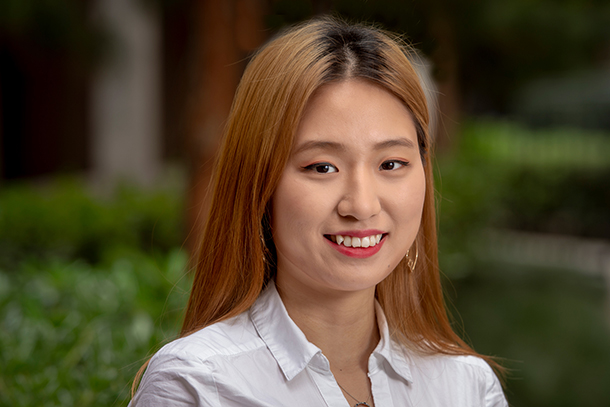Hyun Kyoung “Sarah” Hong has always been interested in helping others.
“In high school, I knew I was interested in psychology and psychiatry, listening and making connections with people,” said the Korea-born Hong, USC Student Health’s new violence prevention specialist, who attended school in Vancouver, British Columbia, and has “been an international student for more than half [her] life.”
It was after a friend — a fellow sorority pledge at the University of Michigan — was sexually assaulted that Hong was first introduced to the world of college violence prevention.
“I wanted to find a way I could be of help to my friend, so I began volunteering for the peer violence prevention program, which is similar to VOICE at USC,” she recalled. “It was there that I learned how to prevent violence and create a community of respect, and the power of peer-to-peer education. So, I am going to be really invested in VOICE.”
The value in assessing community health
After earning her undergraduate degree in biopsychology, cognition and neuroscience, Hong went on to receive both a Master of Public Health and a Master of International Affairs from Columbia University. She wanted to understand and impact the larger social systems that affect individual and community health and well-being.
“People think of public health as vaccines and food safety, but there is a social ecological model to prevention,” Hong said. “There’s the individual making health decisions, but there’s also those who are close to you, your community and the greater society that affect health your decisions. It’s all interconnected.”
She cited a research study she helped conduct at Columbia that looked at how previous incarceration affected subjects’ willingness to stay on their HIV medication. “One participant who identified as a black male, for example, said he didn’t want to carry his HIV medication because he was afraid law enforcement might mistake it for an illegal substance,” she said. “There are multiple layers and variables to an issue, and you have to understand how the variables interact and address a problem that way.”
Act early and prevent campus violence
In the case of college sexual assault and misconduct, Hong approaches the problem with the larger cultural context in mind. “If you ask any student what consent it, you’ll probably get an answer that’s at least 80% correct,” she said. “It’s not a lack of information; it’s changing beliefs, and making sexual assault something we, as a community, disapprove of.”
As a member of USC Student Health’s Relationship and Sexual Violence Prevention and Services team, Hong is designing and spearheading a new affirmative consent workshop for incoming freshmen, which will begin this fall.
She says it is critical to address the topic as soon as students arrive on campus. “College is a time of discovery,” she said. “It’s the first time many young people explore themselves and meet people like they’ve never met before, so it is important to establish a culture of respect, so they know they are safe to explore and grow.”
She will also work to support and sustain the Undergraduate Student Government’s bystander intervention training initiative, Trojans Act Now, through ongoing student leadership transitions and graduations. Hong said she is optimistic that this generation is more receptive to a sex positive culture change than ever before.
“We live in a unique time in which the freshmen coming in are aware of things like social identities and are open to talking about these things,” she said. “This generation also seeks evidence and statements that are backed up by facts, which I appreciate as a public health practitioner.”
— Andrea Bennett


